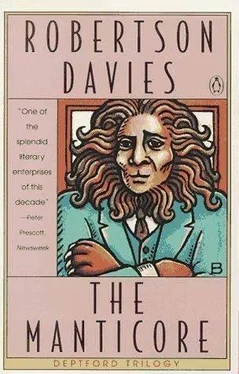Robertson Davies - The Manticore
Здесь есть возможность читать онлайн «Robertson Davies - The Manticore» весь текст электронной книги совершенно бесплатно (целиком полную версию без сокращений). В некоторых случаях можно слушать аудио, скачать через торрент в формате fb2 и присутствует краткое содержание. Жанр: Триллер, на английском языке. Описание произведения, (предисловие) а так же отзывы посетителей доступны на портале библиотеки ЛибКат.
- Название:The Manticore
- Автор:
- Жанр:
- Год:неизвестен
- ISBN:нет данных
- Рейтинг книги:3 / 5. Голосов: 1
-
Избранное:Добавить в избранное
- Отзывы:
-
Ваша оценка:
- 60
- 1
- 2
- 3
- 4
- 5
The Manticore: краткое содержание, описание и аннотация
Предлагаем к чтению аннотацию, описание, краткое содержание или предисловие (зависит от того, что написал сам автор книги «The Manticore»). Если вы не нашли необходимую информацию о книге — напишите в комментариях, мы постараемся отыскать её.
The Manticore — читать онлайн бесплатно полную книгу (весь текст) целиком
Ниже представлен текст книги, разбитый по страницам. Система сохранения места последней прочитанной страницы, позволяет с удобством читать онлайн бесплатно книгу «The Manticore», без необходимости каждый раз заново искать на чём Вы остановились. Поставьте закладку, и сможете в любой момент перейти на страницу, на которой закончили чтение.
Интервал:
Закладка:
I am sure he was right, and I have always wished I could live according to his advice. I have never managed it. Nor did he, as I gradually became aware, but somehow that was different. I needed to be made into a man, and he was fully and splendidly and obviously a man. Everybody knew it.
Lapped as I was in every comfort, and fortunate above other boys, how could I have thought I needed money?
What I did need, and very badly, was character. Manhood. The ability to stand on my own feet. My father left me in no doubt about these things, and as my father loved me very much there could be no question that he was right. Love, in a parent, carries with it extraordinary privileges and unquestionable insight. This was one of the things which was taken for granted in our family, and so it did not need to be said.
Was I then a poor little rich boy, wistful for the pleasures available to my humble friends, the sons of doctors and lawyers and architects, most of whom could not have passed even the hundred-thousand-a-year test? Not at all. Children do not question their destiny. Indeed, children do not live their lives; their lives, on the contrary, live them. I did not imagine myself to be the happiest of mortals because no such concept as happiness ever entered my head, though sometimes I was happy almost to the point of bursting. I was told I was fortunate. Indeed, Netty insisted that I thank God for it every night, on my knees. I believed it, but I wondered why I was thanking God when it was so obviously my father who was the giver of all good things. I considered myself and my family to be the norm of human existence, by which all other lives were to be measured. I knew I had troubles because I was short of pocket-money, but this was trivial compared with the greater trouble of not being sure I would ever be a man, and able to stand on my own two feet, and be worthy of my father's love and trust. I was told that everything that happened to me was for my good, and by what possible standard of judgement would I have reached a dissenting opinion?
So you must not imagine I have come here to whine and look for revenge on the dead; this retrospective spiting and birching of parents is one of the things that gets psychoanalysis a bad name. As a lawyer I know there is a statute of limitations on personal and spiritual wrongs as well as on legal ones, and that there is no court in the world that can provide a rescript on past griefs. But if some thoughtful consideration of my past can throw useful light on my present, I have the past neatly tucked away and can produce it on demand.
DR. VON HALLER: Yes, I think that would be best. You have got into the swing, and done all the proper lawyer-like things. So now let us get on.
MYSELF: What do you mean, exactly, 'the proper lawyer-like things'?
DR. VON HALLER: Expressing the highest regard for the person you are going to destroy. Declaring that you have no real feeling in the matter and are quite objective. Suggesting that something is cool and Dry which by its nature is hot and steamy. Very good. Continue, please.
MYSELF: If you don't believe what I say, what is the point of continuing? I have said I am not here to blacken my father; I don't know what else I can do to convince you that I speak sincerely.
DR. VON HALLER: Very plainly you must go on, and convince me that way. But I am not here to help you preserve the status quo , and leave all your personal relationships exactly as you believe them to be now. Remember, among other things, I am Prisoner's Friend. You know what a friend is, I suppose?
MYSELF: Frankly, I'm not sure that I do.
DR. VON HALLER: Well – let us hope you will find out. About your early childhood -?
I was born on September 2, 1928, and christened Edward David because my father had been an aide-de-camp – and a friend, really – of the Prince of Wales during his 1927 tour of Canada. My father sometimes jokingly spoke of the Prince as my godfather, though he was nothing of the kind. My real godfathers were a club friend of Father's named Dorris and a stockbroker named Taylor, who moved out of our part of the world not long after my christening; I have no recollection of either of them. I think they had just been roped in to fill a gap, and Father had dropped them both by the time I was ready to take notice. But the Prince sent me a mug with his cipher on it, and I used to drink my milk from it; I still have it, and Netty keeps it polished.
I had a number of childhood diseases during my first two years, and became what is called "delicate". This made it hard to keep nurses, because I needed a lot of attention, and children's nurses are scarce in Canada and consequently don't have to stay in demanding places. I had English and Scots nurses to begin with, I believe, and later I used to hear stories of the splendid outfits they wore, which were the wonder of the part of Toronto where we lived. But none of them stuck, and it was my Grandmother Staunton who said that what I needed was not one of those stuck-up Dolly Vardens but a good sensible girl with her head screwed on straight who would do what she was told. That was how Netty Quelch turned up. Netty has been with us ever since.
Because I was delicate, life in the country was thought good for me, and for all of my early years I spent long summers with my grandparents in Deptford, the little village where they lived. My upbringing was a good deal dominated by my grandparents at that time because neither of my parents could stand Deptford, though they had both been born there, and referred to it between themselves as "that hole". So every May I was shipped off to Deptford, and stayed till the end of September, and my memories of it are happy. I suppose unless you are unlucky, anywhere you spend your summers as a child is an Arcadia forever. My grandmother couldn't bear the English nurses, and in my second year she told my mother to send her the baby and she would find a local girl to care for me. Indeed, she had such a girl in mind.
Grandmother was a placid, sweet woman whose great adoration was my father, her only son. She had been "a daughter of the parsonage," and in my scale of values as a child this was fully equivalent to being a friend of the Prince of Wales. I remember that when I was quite small – four or five – I used to pass the time before I went to sleep thinking what a fine thing it would be if the Prince and Grandmother Staunton could meet; they would certainly have some fine talks about me, and I could imagine the Prince deferring to Grandmother on most matters because of her superior age and experience of the world, although of course as a man he would have some pretty interesting things to say; it was likely that he would want me to take charge of Deptford and run it for him. Grandmother was not an active person; she liked sitting, and when she moved she was deliberate. Indeed, she was fat, though I quickly learned that "fat" was a rude word, to be thought but not spoken of older people. It was the job of the good sensible girl to be active, and Netty Quelch was furiously active.
Netty was one of Grandmother's good works. Her parents, Abel and Hannah Quelch, had been farmers, and were wiped out by one of those fires caused by an overheated stove which were such a common disaster in rural Ontario. They were good, decent folk, and had come as young people from the Isle of Man. Henrietta and her younger brother, Maitland, were left orphans and a responsibility of the neighbours because there was no orphanage nearby, and anyhow an orphanage was a place of last resort. A nearby farmer and his wife added them to their own six children and brought them up. And now Netty was sixteen and was to be launched on the world. Level-headed. A demon for work. Deserving, just what Grandmother Staunton wanted.
I have never known the world without Netty, so her personal characteristics seemed to me for a long time to be ordained and not matters on which likes or dislikes had any bearing. She was, and is now, below medium height, so spare that all her tendons, strings, and muscles show when they are at work, noisy and clumsy as small people sometimes are, and of boundless overheated energy. Indeed, the impression you get from Netty is that there is a very hot fire burning inside her. Her skin is dry, her breath is hot and strong and suggests combustion, though it is not foul. She is hot to the touch, but not moist. Her complexion is a reddish-brown, as though scorched, and her hair is a dark, dry-red – not carroty but a withered auburn. Her responses are quick, and her gaze is a parched glare. Of course I am used to her, but people who meet her for the first time are sometimes alarmed and mistake the intensity of her personality for some furious, pent-up criticism of themselves. Caroline and Beesty call her the Demon Queen. She is now my housekeeper, and considers herself my keeper.
Читать дальшеИнтервал:
Закладка:
Похожие книги на «The Manticore»
Представляем Вашему вниманию похожие книги на «The Manticore» списком для выбора. Мы отобрали схожую по названию и смыслу литературу в надежде предоставить читателям больше вариантов отыскать новые, интересные, ещё непрочитанные произведения.
Обсуждение, отзывы о книге «The Manticore» и просто собственные мнения читателей. Оставьте ваши комментарии, напишите, что Вы думаете о произведении, его смысле или главных героях. Укажите что конкретно понравилось, а что нет, и почему Вы так считаете.












